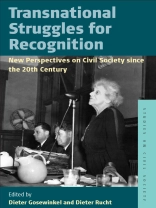Now more than ever, “recognition” represents a critical concept for social movements, both as a strategic tool and an important policy aim. While the subject’s theoretical and empirical dimensions have usually been studied separately, this interdisciplinary collection focuses on both to examine the pursuit of recognition against a transnational backdrop. With a special emphasis on the efforts of women’s and Jewish organizations in 20th-century Europe, the studies collected here show how recognition can be meaningfully understood in historical-analytical terms, while demonstrating the extent to which transnationalization determines a movement’s reach and effectiveness.
Innehållsförteckning
List of Illustrations
PART I: CONCEPTS
Introduction: The Transnationalization of Struggles for Recognition. Introduction and Summary of the Contributions
Dieter Gosewinkel
Chapter 1. Struggles for Recognition: Bridging Three Separated Spheres of Discourse
Dieter Rucht
Chapter 2. Understanding Transnational Social Movements: Potentials and Limits of Recognition Theory
Volker Heins
PART II: THE CASES FOR WOMEN AND JEWS
Chapter 3. ‘By the sacred ties of humanity and common decent’. The Transnationalization of Modern Jewish History and its Discontents
Tobias Metzler
Chapter 4. Jewish, Socialist, Antizionist: The Bund and its Transnational Relations
Gertrud Pickhan
Chapter 5. Institution Building and Policy Making at the Transnational Level: Challenges in the Early History of the World Jewish Congress
Emmanuel Deonna
Chapter 6. Struggles for Recognition and the Concept of Gender in Twentieth Century Poland
Claudia Kraft
Chapter 7. The Emergence of an Impossible Movement: Domestic Workers Organize Globally
Helen Schwenken
PART III: ENLARGING THE SCOPE
Chapter 8. Peace Movements and the Politics of Recognition in the Cold War
Holger Nehring
Chapter 9. Recognition Across Difference: Conceptual Considerations Against an Indian Background
Martin Fuchs
Chapter 10. Injustice Symbols and Global Solidarity
Thomas Olesen
Notes on contributors
Bibliography
Index
Om författaren
Dieter Gosewinkel is a professor of history at the Freie Universität Berlin and co-director of the Center for Global Constitutionalism at the WZB Berlin Social Science Center. He has published widely in the field of modern history, legal history, and history of civil society and citizenship, including Zivilgesellschaft – national und transnational with Dieter Rucht, Wolfgang van den Daele and Jürgen Kocka (Edition Sigma, 2004).












